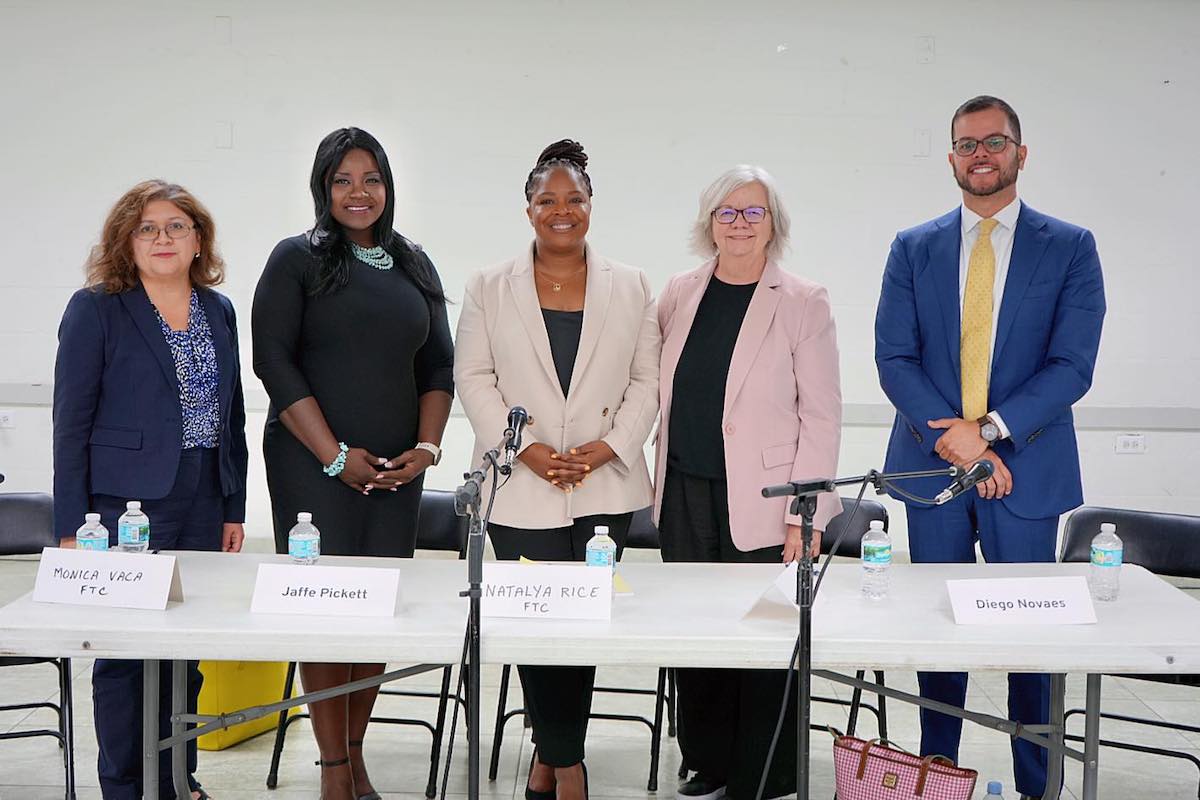Representatives from the Federal Trade Commission and community leaders spoke during a briefing with ethnic media in Tampa, Florida on the rise in text scams targeting minority communities.
A few days ago, Christian Amador received a text message on his smartphone. It wasn’t from someone he knew. He thought he just received a missent text message.
“It was lovely meeting you. I enjoyed our dinner together, and I’m looking forward to getting to know you,” said the text, pointing him to a web link.
He found the tone endearing, so he clicked on the web link. It immediately asked him to provide more personal information.
“At that point,” Amador said, “it became clear to me that it was a scammer.”
Text scams, known as smishing, have been on the rise across the United States. Scammers send different versions of a deceptive text message that is intended to lure the recipient into providing their personal financial information.
Another version of a text scam involves a USPS package delivery that has an unfamiliar web link, requiring the recipient to immediately respond.
“Text message scams, in 2022, cost people more than $330 million,” Monica Vaca, deputy director of FTC’s Bureau of Consumer Protection, said at a recent briefing with ethnic media and community leaders in Tampa, Florida.
Text message scams have escalated rapidly. Back in 2019, the financial losses from text scams were about $66 million, Vaca added. They jumped to roughly $165 million in 2021.
Since many people don’t report when they get scammed, FTC officials said the losses could be much higher.
“It’s a trick. They might pretend to be a package delivery company. We saw this explode with the pandemic when we were all ordering packages from Amazon,” said Vaca. “They’re after your credit card number. They want financial account information so that they can start charging your credit card.”
Getting scammed can be both financially and emotionally devastating. Victims are often too embarrassed or ashamed to reach out for help.
Psychologists say that while victims of other kinds of crime may have similar reactions, fraud adds a few layers of negative thoughts about themselves. Are they not smart? Is there something wrong with their ability to judge and weigh in on what’s right or wrong?
Many people think scams mostly affect older adults or those who have lesser technological knowledge and skills, but reports to the FTC’s Consumer Sentinel tell a different story: anyone can be scammed.
Natalaya Rice, an attorney at FTC’s southeast region, said that whether you have a PhD, or you’re a lawyer or a doctor, you could be scammed—and there’s nothing to be embarrassed about reaching out to family members and reporting it to authorities.
Rice adds that scams affect every age group and demographic, though differently.
“I am a former prosecutor. I am very used to dealing with fraud issues. I’m very sophisticated. I knew what to do about it. And I got scammed,” said Chih Pin Lu, president of the Asian Pacific American Bar Association of Tampa Bay.
He recalled that before he and his family left Tampa for vacation, he tried to confirm their plane tickets, making sure that everything with their booking was fine.
“This was essentially within the 48 hour window before the flight, so I was definitely feeling the pressure to make sure that everything would go fine with our summer vacation plans,” Lou said. “Unfortunately, when my family reached out to the airline, we actually got a fraudulent number, and through that fraudulent number gave our reservation information.”
Then the person on the other line told them that because there were some delays with their flight, they would owe an additional $800.
“Being entirely new to this particular airline, we’re like, ‘Well, that’s never happened to us before, but we’re leaving in two days. We need to make sure we get our reservations completed. So here’s your $800,’” he said.
Lou, however, went back to the credit card company later on and mentioned that he had never heard of being charged extra for a flight. That was the time he learned that he had been scammed.
Vaca of the FTC said that community leaders and partners play a vital role to combat these scams because they could affect anyone.
“We need to go out into communities and try to spread the word, share what it is we know. Do not trust those text messages. Do not click on that link,” she said. “Instead, report it to the FTC at ReportFraud.ftc.gov. And remember, whenever you’re feeling in a little bit of a panic that something is wrong, take a moment, take a breath and talk to somebody about it.”




